Manufacturing activity in Japan expanded at the slowest pace in five months in February as output contracts. This marks the prolonged impact of global supply chain disruptions on the world’s third largest economy.
Activity in the service sector also shrank at the fastest pace since May 2020 as demand remains weak due to fresh restrictions amid resurgence of COVID-19 cases in the country.
The au Jibun Bank Flash Japan Manufacturing PurchasingManagers’ Index (PMI) fell to a seasonally adjusted 52.9 from a final 55.4 in the previous month.
“Manufacturers signalled a reduction in output for the first time in five months, though the rate of contraction was considerably softer than that seen in the dominant services sector,” said Usamah Bhatti, economist at IHS Markit, which compiles the survey.
“Firms continued to report that rising input prices and material shortages, notably in fuel and metals continued to dampen private sector activity,” Bhatti said.
Manufacturers saw stockpiles of raw materials and other inputs rise at the sharpest pace since the start of the survey in October 2001.
The au Jibun Bank Flash Services PMI Index dropped to aseasonally adjusted 42.7, down from the prior month’s final of 47.6.
The au Jibun Bank Flash Japan Composite PMI, which iscalculated by using both manufacturing and services, dropped to 44.6 from January’s final of 49.9, marking the lowest level since June 2020’s 40.8.




